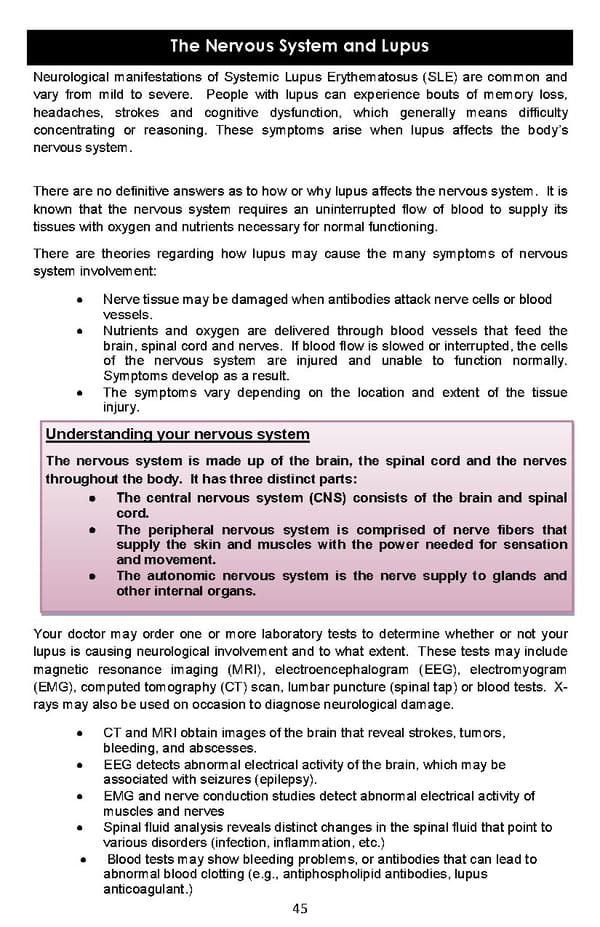The Nervous System and Lupus Neurological manifestations of Systemic Lupus Erythematosus (SLE) are common and vary from mild to severe. People with lupus can experience bouts of memory loss, headaches, strokes and cognitive dysfunction, which generally means difficulty concentrating or reasoning. These symptoms arise when lupus affects the body’s nervous system. There are no definitive answers as to how or why lupus affects the nervous system. It is known that the nervous system requires an uninterrupted flow of blood to supply its tissues with oxygen and nutrients necessary for normal functioning. There are theories regarding how lupus may cause the many symptoms of nervous system involvement: • Nerve tissue may be damaged when antibodies attack nerve cells or blood vessels. • Nutrients and oxygen are delivered through blood vessels that feed the brain, spinal cord and nerves. If blood flow is slowed or interrupted, the cells of the nervous system are injured and unable to function normally. Symptoms develop as a result. • The symptoms vary depending on the location and extent of the tissue injury. Understanding your nervous system The nervous system is made up of the brain, the spinal cord and the nerves throughout the body. It has three distinct parts: • The central nervous system (CNS) consists of the brain and spinal cord. • The peripheral nervous system is comprised of nerve fibers that supply the skin and muscles with the power needed for sensation and movement. • The autonomic nervous system is the nerve supply to glands and other internal organs. Your doctor may order one or more laboratory tests to determine whether or not your lupus is causing neurological involvement and to what extent. These tests may include magnetic resonance imaging (MRI), electroencephalogram (EEG), electromyogram (EMG), computed tomography (CT) scan, lumbar puncture (spinal tap) or blood tests. X- rays may also be used on occasion to diagnose neurological damage. • CT and MRI obtain images of the brain that reveal strokes, tumors, bleeding, and abscesses. • EEG detects abnormal electrical activity of the brain, which may be associated with seizures (epilepsy). • EMG and nerve conduction studies detect abnormal electrical activity of muscles and nerves • Spinal fluid analysis reveals distinct changes in the spinal fluid that point to various disorders (infection, inflammation, etc.) • Blood tests may show bleeding problems, or antibodies that can lead to abnormal blood clotting (e.g., antiphospholipid antibodies, lupus anticoagulant.) 45
 Living Well With Lupus Facts Booklet Page 44 Page 46
Living Well With Lupus Facts Booklet Page 44 Page 46